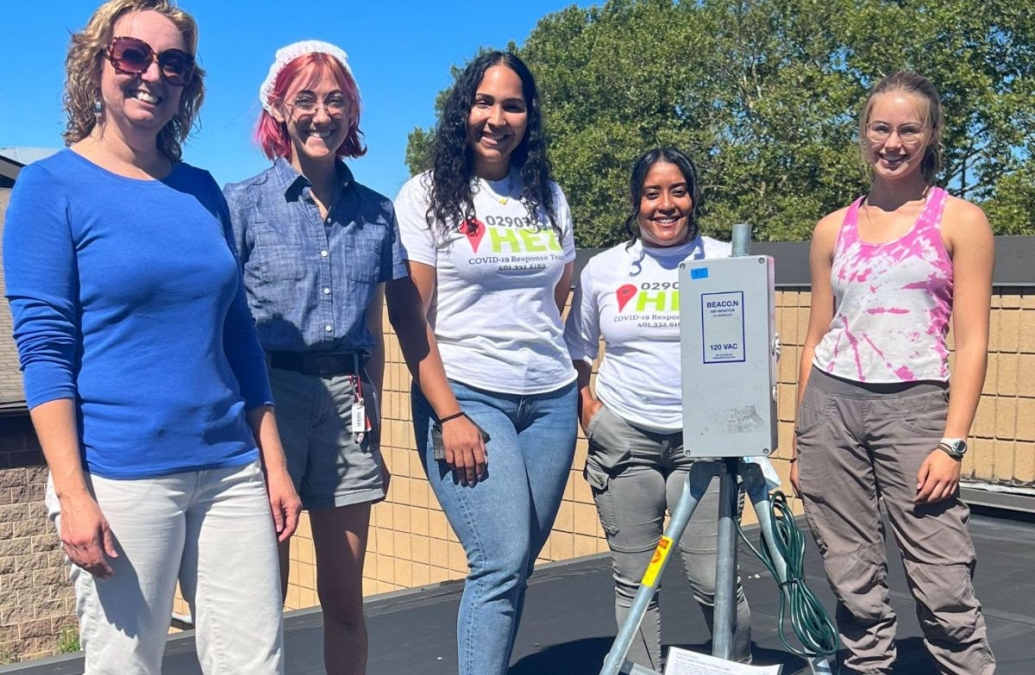Engaged Faculty Spotlight: Improving Air and Water Quality through Community Collaboration

Dr. Hastings with her students setting up the air quality monitors.
This month we spotlight faculty members across the university who are working with communities to improve air and water quality.
Dr. Meredith Hastings, professor of Earth, Environmental and Planetary Sciences and deputy director of the Institute at Brown for Environment and Society, and Dr. Scott Frickel, professor of Sociology and Environment and Society, are co-teaching ENVS 1247: Clearing the Air: Environmental Studies of Pollution. Students in the class will contribute to Hastings’ community-based project, Breathe Providence, which was inspired by the City of Providence’s Climate Justice Plan and developed in partnership with local government and community organizations including the City of Providence, the Racial and Environmental Justice Committee, American Lung Association and the Conservation Law Foundation. After placing 25 air pollution monitors across the city to test for pollutants identified by the EPA as well as carbon dioxide, this work will help bring to light the differences in pollutants across Providence. Dr. Hastings has already involved several students in the Breathe Providence Project to gain first-hand research experience and work within communities. When asked how she began engaging with the community, Dr. Hastings noted, “Community work takes time and relationship building. . . . Making connections is key, and we need to think about how to work more collaboratively.”
Scott Frickel’s research focuses on the intersection of nature, knowledge and politics with a focus on socio-environmental change. He previously ran the Community Engagement Core for the Superfund Research Program. Under the Superfund research grant, he has built historical datasets on both active and former manufacturing sites, and former hazardous retail sites across Providence. Students in ENVS 1247 are considering how air quality in different neighborhoods may reflect a legacy of pollution and connections to social and economic demographics of the city, digging deeper into the experiences of those neighborhoods. Dr. Frickel became passionate about community-engaged work while working with environmental justice groups in the industrial corridor and the Lower Mississippi Delta while at Tulane University in New Orleans; he was intrigued by “scientists from the various disciplinary backgrounds who are actively engaged in movements for equity and justice as well as how experts are sort of enrolled or mobilized into those grassroots movements.” Dr. Hastings is motivated by passion for advancing equity both in pollution exposure and in STEM. She and Dr. Frickel look forward to continuing to build on these projects and the co-taught course and to provide more students with hands-on community-based experiences in the city where they live.
Dr. Erica Walker, the RGSS Assistant Professor of Epidemiology at the School of Public Health, incorporates community engagement into much of her research and teaching. Dr. Walker runs the Community Noise Lab, and while the laboratory was originally developed to explore the relationship between community noise and health, after working in her home state of Mississippi, she now incorporates air, water, and visual pollution into her research activities. Dr. Walker works directly with communities and believes “ten out of ten times there is a concerned resident or organization in the community that has already thought of it, knows it better than me, and is already on the ground doing the work. . . . They are your partners, your brain trust, your teachers, and are experts. They should be acknowledged, compensated, appreciated, and recognized in the same way we would want to be.”
In addition to working with communities on problems that matter most to them, Dr. Walker aims to create tools and data that community members can use long after her work is completed. Dr. Walker teaches PHP 1720: Environmental Exposure Assessments in Practice, a course where both undergraduate and graduate students work on a community-defined problem. Students learn how to conduct exposure assessments, analyze data, develop community reports, and both organize and conduct a final community meeting. Dr. Walker is also currently working with two Health Equity Scholars on environmental health projects in Providence: Shaunessy Burks is conducting an indoor air quality intervention at a series of home-based child day care centers, and Rosemelly Jimenez Medal is organizing a series of hearing screening events. In Mississippi, Dr. Walker is working with local high school students to measure air, noise, and water quality in their communities in Greater Jackson. Dr. Walker informs journalists and the broader public as well, such as doing an interview with SciLine to discuss how noise pollution varies among people with different socio-economic resources and developing the Greater Jackson Water Watch, which informs local residents about their tap water quality in real-time. For those who “are working on solving meaningful questions and are dedicated to leaving behind tangible resources that can be used for further advocacy, the partnerships will come,” recommends Dr. Walker.
